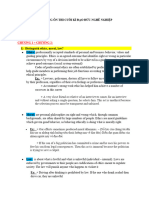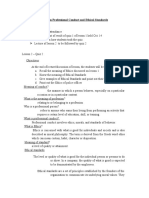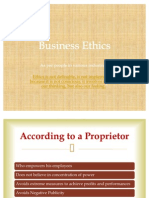Question 1
Question 1
Uploaded by
DANH LÊ VĂNCopyright:
Available Formats
Question 1
Question 1
Uploaded by
DANH LÊ VĂNCopyright
Available Formats
Share this document
Did you find this document useful?
Is this content inappropriate?
Copyright:
Available Formats
Question 1
Question 1
Uploaded by
DANH LÊ VĂNCopyright:
Available Formats
Professionalism, integrity and objectivity
Questions: In your understandings, what are professionalism, integrity
and objectivity? Why do these principles relate to the independence?
❖ Definition of “professionalism”
“Professionalism” is the combination of all the qualities that are
connected with trained and skilled people. It requires both knowledge of moral
principles and skills in applying them to problems and decisions.
For example: Due to professional care, auditors must balance and
navigate the financial statement as faithfully as possible in spite of the
difference between two side objectives by using knowledge of moral principles
and principles of integrity, and objectivity.
❖ Definition of “integrity”
“Integrity” is one of personal character, the quality of being honest or
standards of doing their job, and that person's determination not to lower
those standards.
For example: A company wants a nice financial statement but in reality
it is not pretty good. Auditors can do nothing but honestly deliver the truth, and
honor the public interest. Auditors must have high integrity so that people can
continue to believe in the services they provide.
❖ Definition of “objectivity”
“Objectivity” is the fact of being based on facts and not influenced by
personal beliefs or feelings or doing without biasing.
For example: Accounts payable clerk should be hired as an external
auditor. If auditors are hired from other departments, internal auditors might be
auditing their own past work, we can not be sure if they will be objective,
follow the policy, or ignore the previous mistakes of a friend. However, it does
not mean that automatically auditors from other departments can’t be
objective, but the possibility of risk would be considered.
❖ The relationship between these principles s and the independence
Independence consists of three principles: professionalism, integrity,
and objectivity. Since independence is an attitude and action in carrying out
an examination to be impartial to anyone and not influenced by anyone, it’s
similar to objectivity. In order to carefully undertake action, it requires skills
and a sense of responsibility, knowledge so professionalism is also linked to
independence. When the auditor has an independent state of mind, they must
have integrity in what they service so that people can continue to believe.
You might also like
- Aptitude and Foundational Values For Civil ServicesDocument22 pagesAptitude and Foundational Values For Civil ServicesDevendra100% (1)
- Ethics and Profesionalisim TrainingDocument20 pagesEthics and Profesionalisim TrainingPEDRONo ratings yet
- Radiation 3Document19 pagesRadiation 3Saroj JenaNo ratings yet
- ABS-LECTURE 3 (Professional Ethics)Document32 pagesABS-LECTURE 3 (Professional Ethics)Lordwin ArcherNo ratings yet
- Couns Mod 6 - EthicsDocument7 pagesCouns Mod 6 - EthicsHarshita KapoorNo ratings yet
- Topic 2 The Role of Professional AccountantDocument27 pagesTopic 2 The Role of Professional AccountantYanPing AngNo ratings yet
- Module Midterm Pm106Document42 pagesModule Midterm Pm106CJNo ratings yet
- Ch.3 VEDocument15 pagesCh.3 VECarl Angelo SuarezNo ratings yet
- Đề Cương Ôn Thi Cuối Kì Đạo Đức Nghề NghiệpDocument21 pagesĐề Cương Ôn Thi Cuối Kì Đạo Đức Nghề NghiệpNam Nguyễn HoàngNo ratings yet
- Auditing Chapter2Document7 pagesAuditing Chapter2Getachew JoriyeNo ratings yet
- Public Sector Auditing My Homework and Discussion AnswersDocument25 pagesPublic Sector Auditing My Homework and Discussion AnswersLoganPearcy100% (1)
- Unit 6 ProfessionalismDocument40 pagesUnit 6 Professionalismatomsa shiferaNo ratings yet
- Inetgity-values-trust_0d83b220032cd4355846ac936286aef6Document2 pagesInetgity-values-trust_0d83b220032cd4355846ac936286aef6anoop6387276254No ratings yet
- Assignment 3Document2 pagesAssignment 3Lourdes AmparadoNo ratings yet
- Attitude& Mindset in Public Service-DoneDocument20 pagesAttitude& Mindset in Public Service-DoneShamimNo ratings yet
- Professional Ethics: The Professional-Client RelationshipDocument13 pagesProfessional Ethics: The Professional-Client RelationshipジェロームNo ratings yet
- Ethics in Counseling: Dr. Sunita Singh Faculty of Education Banaras Hindu University, VaranasiDocument19 pagesEthics in Counseling: Dr. Sunita Singh Faculty of Education Banaras Hindu University, VaranasiDr. Sunita SinghNo ratings yet
- Key Qualities of ProfessionalsDocument12 pagesKey Qualities of ProfessionalsrjpenaNo ratings yet
- EthicsDocument19 pagesEthicsharshc.ds.24No ratings yet
- Professional ValuesDocument48 pagesProfessional Valuesjohnyjoseph2016No ratings yet
- Core Principles of Fairness, Accountability, and TransparencyDocument27 pagesCore Principles of Fairness, Accountability, and TransparencyMaricel EranNo ratings yet
- Unit 5-ProfessionalismDocument28 pagesUnit 5-Professionalismmebratumulugeta1086No ratings yet
- Bus. Ethics Module 3Document19 pagesBus. Ethics Module 3Heart Fayie ConteNo ratings yet
- Accountability and Assertiveness Adv NursingDocument12 pagesAccountability and Assertiveness Adv NursingDebipriya MistryNo ratings yet
- The Discipline of Social WorkDocument32 pagesThe Discipline of Social WorkJericho ArinesNo ratings yet
- 1 - 21 22 - Lecture6 - Principles of EthicsDocument4 pages1 - 21 22 - Lecture6 - Principles of EthicsAngel AquinoNo ratings yet
- Social Work Principle - ReviewerDocument22 pagesSocial Work Principle - ReviewerJoy Alga Gako100% (1)
- Week 2Document20 pagesWeek 2Len ReyesNo ratings yet
- Ethics in Computing - Unit 5 and 6Document45 pagesEthics in Computing - Unit 5 and 6AlexNo ratings yet
- 02 PPTprofessional Integrity 1Document21 pages02 PPTprofessional Integrity 1Aasif Ali100% (1)
- 16,32,34 - Teacher Accountability Unit 1 Part BDocument19 pages16,32,34 - Teacher Accountability Unit 1 Part BPriya SinghNo ratings yet
- Pe 2Document19 pagesPe 2Kuntal VasoyaNo ratings yet
- Lecture-1-Introduction To Professional EthicsDocument57 pagesLecture-1-Introduction To Professional EthicsFatima HumayunNo ratings yet
- Corporate CultureDocument5 pagesCorporate Culturebernadette concillesNo ratings yet
- Professional Conduct and Ethical StandardsDocument6 pagesProfessional Conduct and Ethical StandardsSalvari VitasNo ratings yet
- 04 Pp-5 As ConsultantDocument18 pages04 Pp-5 As ConsultantZahid KhanNo ratings yet
- The Core Principles Underlying Fairness, Accountability, and Transparency in Business Operation and StewardshipDocument15 pagesThe Core Principles Underlying Fairness, Accountability, and Transparency in Business Operation and StewardshipCharles Algreen CenaNo ratings yet
- EthicsDocument28 pagesEthicsgopicse007No ratings yet
- Types of Professional EthicsDocument5 pagesTypes of Professional EthicsnarooldmantosNo ratings yet
- Module III Professional Ethics of A CounsellorDocument6 pagesModule III Professional Ethics of A CounsellorLavanya KakkarNo ratings yet
- Business EthicsDocument5 pagesBusiness EthicschauromweaNo ratings yet
- Professional Ethics and Social ResponsibilitiyDocument22 pagesProfessional Ethics and Social Responsibilitiyhoneysgh.394No ratings yet
- Honesty: Engr. Ahmad Sheraz Cheema Department of Industrial & Manufacturing EngineeringDocument19 pagesHonesty: Engr. Ahmad Sheraz Cheema Department of Industrial & Manufacturing EngineeringDavid HamxaNo ratings yet
- Updated Ethics Notes For Medicine and GenderDocument8 pagesUpdated Ethics Notes For Medicine and GenderMuse SamNo ratings yet
- Chapter 2Document21 pagesChapter 2Danish NabilNo ratings yet
- #C C C$ C%C& C' C (CDocument4 pages#C C C$ C%C& C' C (CThong Chee WheiNo ratings yet
- Code of Conduct... NotesDocument8 pagesCode of Conduct... Notesarthur guil-anNo ratings yet
- Ethical Principle1Document5 pagesEthical Principle1saidimounakhaoula10No ratings yet
- Ethics Chapter 4Document13 pagesEthics Chapter 4yewendater teshomeNo ratings yet
- 專業倫理期中Document4 pages專業倫理期中鄭子歆No ratings yet
- Principles of CounsellingDocument6 pagesPrinciples of CounsellingMatthew Marcellinus Apai JC100% (1)
- As Per People in Various Industries. As Per People in Various Industries.Document7 pagesAs Per People in Various Industries. As Per People in Various Industries.Vinayak1311No ratings yet
- Unit1-PPLE MaterialDocument12 pagesUnit1-PPLE MaterialSunil kumarNo ratings yet
- Reporting EraDocument16 pagesReporting EraellahcuratoNo ratings yet
- Michael Derosia: The Five Core Values of Public AdministrationDocument4 pagesMichael Derosia: The Five Core Values of Public AdministrationAlynna Sandatu100% (2)
- U1.1 Human Values, Values and EthicsDocument14 pagesU1.1 Human Values, Values and Ethicsachievesucess111No ratings yet
- Ethics in ConsultingDocument5 pagesEthics in Consultingranmao1408No ratings yet
- Presentation 01 Lecture HUMN 501 2019 - FahadDocument38 pagesPresentation 01 Lecture HUMN 501 2019 - Fahadsrede565No ratings yet
- Understanding Individual BehaviorDocument17 pagesUnderstanding Individual BehaviorAi ÅiNo ratings yet
- Đề Bài Đáp Án: Which of the following are examples of non-financial performance indicators? Select ALL that may applyDocument11 pagesĐề Bài Đáp Án: Which of the following are examples of non-financial performance indicators? Select ALL that may applyDANH LÊ VĂNNo ratings yet
- C5Document18 pagesC5DANH LÊ VĂNNo ratings yet
- Heteros Ce Dasti CityDocument5 pagesHeteros Ce Dasti CityDANH LÊ VĂNNo ratings yet
- MPC kiểm toánDocument9 pagesMPC kiểm toánDANH LÊ VĂNNo ratings yet
- File Tổng Hợp Quizz Ktqt 1: File này mấy bạn muốn sao chép, chia sẻ, hay đi phô tô thì thoải mái nhaDocument38 pagesFile Tổng Hợp Quizz Ktqt 1: File này mấy bạn muốn sao chép, chia sẻ, hay đi phô tô thì thoải mái nhaDANH LÊ VĂNNo ratings yet
































































